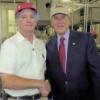My understanding of TimG's opinion on "Where required by the customer, the company shall provide information to enable the last manufacturer or processor of the product to be approved. This shall include the identity of this manufacturer or processor.", is that, the BRC certified broker can choose their own customers. If you ARE my customer, I shall provide such information that you need. But if I decide NOT to take you as my customer (might be because of the one-time purchase), I don't have to be responsible to you from any point. Am I misunderstanding it?
Then the thing becomes, if the broker and Deena185 made the deal, Deena paid and the broker shipped, the broker has to provide such info as Deena required. Because Deena now IS the customer of this BRC certified broker.
Strictly speaking, yes, this is correct - the tense in the glossary definition of customer is "has been" provided, thus at the point of offer Deena's business wouldn't yet be a customer. Nonetheless it's pretty weird to make an offer of sale and signify at least a (presumably genuine) intent to make a party into a customer, whilst apparently fully intending to not comply with the requirements of the standard. For a trader to hide behind the semantics of when a customer becomes a customer does seem a touch disingenuous to me.
I totally understand not wanting to name a supplier, because a sneaky customer can just cut out the middleman and go directly to the manufacturer at that point (if they so choose). As Deena pointed out, it would probably be worth having the customer sign an agreement that they will not source directly with the actual manufacturer (if it's allowable by legal teams).
I'm still rather sceptical about this to be honest. It's an excuse that got wheeled out a lot when we first looked at the Agents & Brokers standard, ahead of the final publication of Issue 1, but in my experience having been a trader for well over a decade now it rarely works out that way in practice. The significant factors in this seem to be:
Scale/volume - if the customer needed that much product then they'd probably already have relationships with appropriate factories. In practice if they're working via brokers it often seems to be the case that they don't want to buy FCLs / can't hit the MOQs.
Simplicity - a lot of food businesses at the end of the chain are dealing with ingredients across a range of categories, and it's much easier to deal with brokers who specialise in those areas than have to buy direct from multiple different sources (and again the practicalities of MOQs have a bearing on this).
Relationships - if you want to be successful as a trader then you ideally need strong relationships with your sources, so utilise those to help protect yourself. Talk to your suppliers and tell them who you're working with (they'll potentially know anyway, when they get the barrage of paperwork and/or delivery addresses for direct shipments). On the rare occasion that a customer may try to cut you out, they'll already be aware of who is contacting them, and can simply say: "please contact (trader), who is our representative in your country/region". The same simplicity argument above applies this way around too - it's easier for the manufacturer to deal with a small number of traders than a mass of smaller clients, particularly on an international scale.
To be honest by the time the formal requirement came in with Issue 2 of the standard, it made absolutely no difference to the way we do business. The UK seems to very much expect complete transparency so it's one of the costs of doing business here, which is possibly why my view on this seems to be somewhat at odds with some of our friends on the other side of the Atlantic  .
.
Nonetheless I can say with absolute certainty that embracing this early has only been a good thing for us - rather than losing business we gained significantly at the expense of less forward-looking competitors.

















